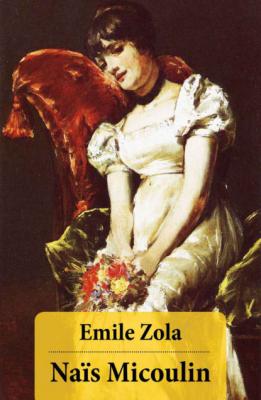Naïs Micoulin (Unabridged). Emile Zola
Чтение книги онлайн.
Читать онлайн книгу Naïs Micoulin (Unabridged) - Emile Zola страница 2
 had sense enough to see that he must play the part of a tractable son. The hypocrisy of a child curbed by fear had little by little grown upon him. His mother now declared herself satisfied; he took her to church, behaved most properly with her, told her with the greatest calmness the most unheard-of lies, which she believed, thanks to his air of candour. And so clever did he become in this respect that he never allowed himself to be outwitted, being always ready with an excuse, always prepared in advance with the most extraordinary stories in support of his statements. He paid his gaming debts with money borrowed from his cousins, and his pecuniary transactions would have filled a book. Once, after an unhopedfor stroke of good luck, he was able to turn a dream he had of spending a week in Paris into reality, by getting himself invited thither by a friend who had a little estate near the Durance.
had sense enough to see that he must play the part of a tractable son. The hypocrisy of a child curbed by fear had little by little grown upon him. His mother now declared herself satisfied; he took her to church, behaved most properly with her, told her with the greatest calmness the most unheard-of lies, which she believed, thanks to his air of candour. And so clever did he become in this respect that he never allowed himself to be outwitted, being always ready with an excuse, always prepared in advance with the most extraordinary stories in support of his statements. He paid his gaming debts with money borrowed from his cousins, and his pecuniary transactions would have filled a book. Once, after an unhopedfor stroke of good luck, he was able to turn a dream he had of spending a week in Paris into reality, by getting himself invited thither by a friend who had a little estate near the Durance.
Frédéric was a fine young fellow, tall, with regular features, and a black beard. His vices made him good company, especially with ladies. He was quoted for his good manners. Those who knew his goings on smiled a little, but, as he had the sense to throw a veil over this side of his life, he came in for a certain amount of credit for not making an exhibition of his excesses, as did other students who were the scandal of the town.
Frédéric was nearly twenty-one, and was soon to pass his last examination. His father, who was still young and not inclined as yet to hand his practice over to him, talked of making him enter the magistrature to begin with. He had friends in Paris to whom he could apply to get him an appointment as public prosecutor’s assessor. The young man raised no objection; for he never openly opposed his parents; but a certain expressive smile on his face betokened his firm determination to prolong the pleasant existence which suited him so well. He knew that his father was rich, that he was his only son, so why should he trouble himself? In the meantime he smoked his cigar on the Promenade, gambled in the neighbouring cafés, and paid his attentions to a variety of damsels, though all this did not prevent him from holding himself at his mother’s orders, and loading her with attentions. At times when he felt out of sorts he stayed at home in the huge gloomy mansion in the Rue du Collège, and enjoyed delicious repose. The emptiness of the rooms, the sense of constraint perceptible on every side, seemed to him to possess a soothing influence. There he collected himself afresh, making his mother believe that he was stopping at home for her sake, until the day when, health and appetite having returned, he devised some fresh escapade. In one word, he was the best fellow in the world, so long as his pleasures were not interfered with.
Every year, however, Naïs came to the Rostands with her fish and fruit, and every year she grew. She was of the same age as Frédéric, or, to be correct, she was just three months older. Madame Rostand would often say to her:
‘What a big girl you are growing, Naïs!’
And Naïs would smile, showing her white teeth. As a rule, Frédéric was not there; but one day, during the last year of his probation, he was going out, when he found Naïs standing in the hall with her basket. He stopped short in astonishment. He did not recognise the girl, though he had seen her only the year before at La Blancarde. Naïs was looking superb, with her dark face beneath a swarthy covering of thick black hair, her broad shoulders, her supple waist, and her magnificent arms, of which the bare wrists were exposed. In a single year she had grown like a young tree.
‘You!’ said he, in a hesitating voice.
‘Yes, Monsieur Frédéric,’ replied Naïs, looking him in the face with her big eyes, in which a sombre fire smouldered. ‘I’ve brought some sea-urchins. When are you coming? Shall I get the nets ready?’
He was still looking at her, and muttering, as if he had not heard her speak: ‘How handsome you are, Naïs! What is there in you?’
The compliment made her smile. Then, as he took her hands playfully, as he had done in the days gone by, she became serious, and said in a hoarse whisper: ‘No, no; not here. Take care! here comes your mother.’
Конец ознакомительного фрагмента.
Текст предоставлен ООО «ЛитРес».
Прочитайте эту книгу целиком, купив полную легальную версию на ЛитРес.
Безопасно оплатить книгу можно банковской картой Visa, MasterCard, Maestro, со счета мобильного телефона, с платежного терминала, в салоне МТС или Связной, через PayPal, WebMoney, Яндекс.Деньги, QIWI Кошелек, бонусными картами или другим удобным Вам способом.